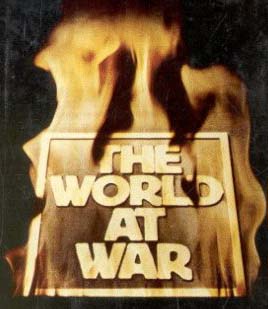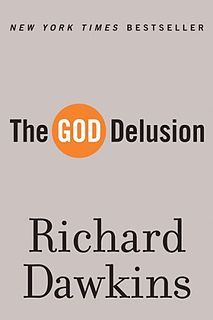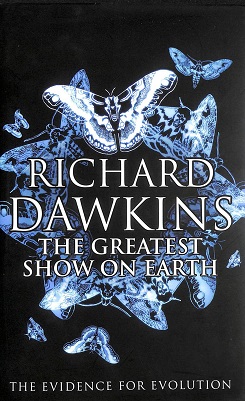A meme is an idea, behavior, or style that spreads from person to person within a culture—often with the aim of conveying a particular phenomenon, theme, or meaning represented by the meme. A meme acts as a unit for carrying cultural ideas, symbols, or practices, that can be transmitted from one mind to another through writing, speech, gestures, rituals, or other imitable phenomena with a mimicked theme. Supporters of the concept regard memes as cultural analogues to genes in that they self-replicate, mutate, and respond to selective pressures.

The World at War (1973–74) is a 26-episode British television documentary series chronicling the events of the Second World War. It was at the time of its completion in 1973, at a cost of £900,000, the most expensive factual series ever made. It was produced by Jeremy Isaacs, narrated by Laurence Olivier and included music composed by Carl Davis. The book, The World at War, published the same year, was written by Mark Arnold-Forster to accompany the TV series.

Donn Alan Pennebaker was an American documentary filmmaker and one of the pioneers of direct cinema. Performing arts and politics were his primary subjects. In 2013, the Academy of Motion Picture Arts and Sciences recognized his body of work with an Academy Honorary Award or "lifetime Oscar".

The Root of All Evil?, later retitled The God Delusion, is a television documentary written and presented by Richard Dawkins in which he argues that humanity would be better off without religion or belief in God.

The God Delusion is a 2006 book by English biologist Richard Dawkins, a professorial fellow at New College, Oxford and former holder of the Charles Simonyi Chair for the Public Understanding of Science at the University of Oxford.

"Future Echoes" is the second episode of the science fiction sitcom Red Dwarf series one, and was first broadcast on the British television channel BBC2 on 22 February 1988. It was written by co-creators Rob Grant and Doug Naylor, and directed by Ed Bye.
"Go God Go" is the twelfth episode in the tenth season of the American animated television series South Park. The 151st episode of the series overall, it originally aired on Comedy Central in the United States on November 1, 2006. The episode is the first in a two-part story arc, which concludes with "Go God Go XII".

Jameel Sadik "Jim" Al-Khalili is a British theoretical physicist, author and broadcaster. He is Professor of Theoretical Physics and Chair in the Public Engagement in Science at the University of Surrey. He is a regular broadcaster and presenter of science programmes on BBC radio and television, and is a frequent commentator about science in other British media.

The Dawkins Delusion? Atheist Fundamentalism and the Denial of the Divine is a book by the theologian Alister McGrath and the psychologist Joanna Collicutt McGrath. It is written from a Christian perspective as a response to arguments put forth in The God Delusion by Richard Dawkins. The work was published in the United Kingdom in February 2007 by the Society for Promoting Christian Knowledge and in the United States in July 2007.

Growing Up in the Universe was a series of lectures given by Richard Dawkins as part of the Royal Institution Christmas Lectures, in which he discussed the evolution of life in the universe.

The Enemies of Reason is a two-part television documentary, written and presented by evolutionary biologist Richard Dawkins, in which he seeks to expose "those areas of belief that exist without scientific proof, yet manage to hold the nation under their spell", including mediumship, acupuncture and psychokinesis.

The Genius of Charles Darwin is a three-part television documentary, written and presented by evolutionary biologist Richard Dawkins.

The Greatest Show on Earth: The Evidence for Evolution is a 2009 book by British biologist Richard Dawkins, which was released on 3 September 2009 in the UK and on 22 September 2009 in the US. It sets out the evidence for biological evolution, and is Dawkins's 10th book, following his best-selling critique of religion The God Delusion (2006) and The Ancestor's Tale (2004), which traced human ancestry back to the dawn of life.
New Atheism is a term coined in 2006 by the journalist Gary Wolf to describe the positions promoted by some atheists of the twenty-first century. This modern-day atheism is advanced by a group of thinkers and writers who advocate the view that superstition, religion and irrationalism should not simply be tolerated but should be countered, criticized, and exposed by rational argument wherever their influence arises in government, education, and politics. According to Richard Ostling, Bertrand Russell, in his 1927 essay Why I Am Not a Christian, made recommendations similar to those proposed by the New Atheists, suggesting that there are no substantive differences between traditional atheism and New Atheism.
Faith School Menace? is a television documentary presented by Richard Dawkins which explores the effects of faith schools on the students in them and society in general by taking examples in particular from UK faith schools, with the stated aim "to explore the balance of rights between a parent's right to educate a child in their own faith, and the children's rights to determine their own beliefs and approach the world with a genuinely open mind".
Doctor Who: Thirty Years in the TARDIS is a one-off, 50-minute television documentary, broadcast to celebrate the thirtieth anniversary of the science-fiction series Doctor Who. It was originally transmitted on Monday 29 November 1993, on BBC One.
Sex, Death and the Meaning of Life is a three-part television documentary presented by Richard Dawkins which explores what reason and science might offer in major events of human lives. He argues that ideas about the soul and the afterlife, of sin and God's purpose have shaped human thinking for thousands of years. He believes science can provide answers to some of these old questions we used to entrust to religion.
The Blind Watchmaker is a documentary where Richard Dawkins challenges William Paley's theories on creationism and takes on Paley's descendants. It was produced in 1987 by Jeremy Taylor and Richard Dawkins for BBC Horizon series and won the Sci-Tech Award for Best Science Documentary of the year. It was based on a book of the same name written by Dawkins in 1986.














